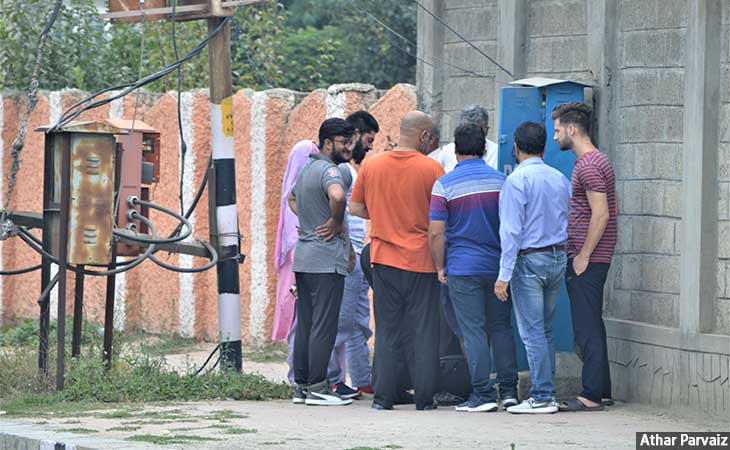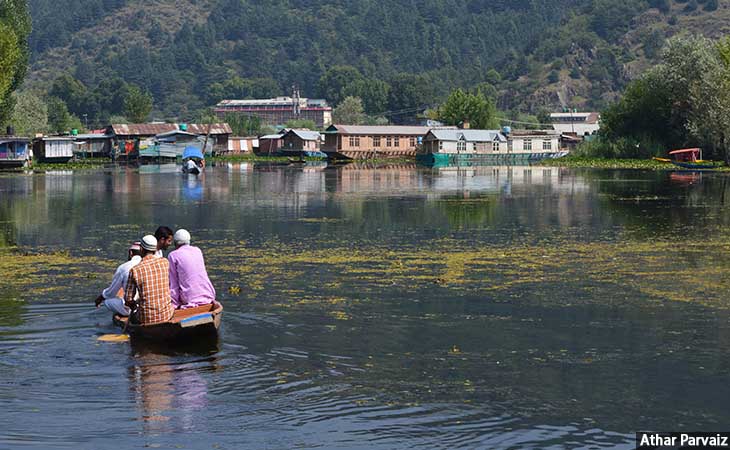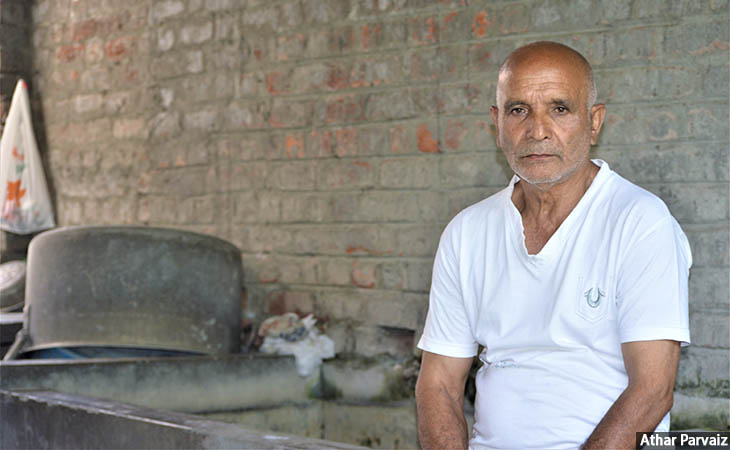Srinagar and Baramulla: Haji Mohammed Ghani, 74, squatted at the border of his apple orchard, sporting a neatly trimmed, white beard, and a frown. Around him were trees laden with apples ripe for picking.

“We survived the hailstorm this year but we will not be able to survive this disaster,” says Haji Mohammed Ghani, 74, apple orchard owner, on the communication crisis in Kashmir that hit his fruit trade.
At this time of year, his orchard–in a state that produces two-thirds of India’s apples, earning Rs 6,500 crore ($903 million) in exports in 2016-17, contributing to a 10th of the state’s gross domestic product (GDP) and employing 3.3 million workers–should have been buzzing with pickers and packers readying the fruits for shipment across India.
On September 8, 2019, when we visited his orchard, there was no activity.
Ghani owns five acres of land in an area famous for apple orchards, a village called Choora near the town of Sopore in Baramulla district, 55 km northwest of Srinagar. The trees yield 5,000 boxes of fruit every year, fetching Ghani a profit of Rs 5 lakh.
This year, he will settle for whatever he gets.
Since August 5, 2019, when the Centre snapped all communication lines in Kashmir–as it abrogated Section 370, which gave Jammu & Kashmir (J&K) special constitutional status–Ghani has not been able to speak to traders in Delhi, Kolkata and Patna to negotiate prices. Several traders used to come to Kashmir to collect the fruit, but they cannot make the trip this year.
Some of Ghani’s apples were being sold at the Sopore fruit market but after a September 7, 2019, attack on a trader family by unknown gunmen, even that is not an option.
“We survived the hailstorm this year but we will not be able to survive this disaster,” Ghani told IndiaSpend. Now, Srinagar’s fruit hawkers stock his apples but they pay half the normal market price. But Ghani would rather settle for that than let his apples rot. “We have been destroyed,” he said.
On September 4, 2019, deputy commissioner of Srinagar, Shahid Chaudhary, tweeted that the National Agricultural Cooperative Marketing Federation of India (NAFED)–a state-run national cooperative to market agricultural goods–will buy all the apples grown in Kashmir at “competitive rates”.
Without the internet or mobile phone services, this news had not reached the apple orchard farmers we spoke to on September 8, 2019.
NAFED has not bought any apples over the three decades to 2019; it opened an office in Srinagar in the first week of September and got orders on September 10, The Indian Express reported. “It leaves us with hardly much time to undertake registration of growers, collecting their Aadhaar and bank account details for making direct benefit transfer payment,” the newspaper quoted an official as saying.
To assess the impact of the communication disruption on the valley’s businesses, we travelled across Srinagar and Baramulla districts, speaking to entrepreneurs and workers from various sectors. The ongoing crisis has crippled almost every business–traditional ones like fruit trade and tourism and nascent ones like e-commerce and software. Shops remain closed for hours, migrant workers have left the state, local employees are refusing to return to work, hotels are empty and businesses can no longer communicate with clients.
To return to Ghani’s story, September is harvest season in Kashmir’s orchards, but the events of August 2019 have nearly killed the fruit trade.

Locals huddle around technicians as they restore landlines in Haiderpura, Srinagar on September 7, 2019.
Shops open twice a day
Despite the government’s assertion that normalcy has returned, shops and businesses remained shut in Kashmir during IndiaSpend’s visit to the valley. No public transport was available in Srinagar, forcing everyone, including the poor, to hitch rides in private vehicles.
Shops opened only twice a day, early morning and late evening. Shutters were down through the day and men sat chatting and youngsters played carom at their doorsteps. Women and children mostly remained indoors.
Armed troopers from the Central Reserve Police Force in protective gear stood every few metres. Most roads had barbed wire barricades, and traffic was frequently redirected for security reasons.
Landlines were partially functional, but most households remained out of touch with the world because they had surrendered their land phones, we found. While cable and dish TV were working, international channels remained blocked in some areas. But radios were airing international stations and people stayed hooked to them for news.
In peak season, hotels and houseboats have no guests

This is high tourist season but all hotels, houseboats and guesthouses are empty in Srinagar. Tourism has the potential of generating over 2.6 million jobs in the valley, as per estimates.
We arrived in Srinagar at what would normally be peak tourist season, but there was no activity on the edges of the popular Dal lake, where houseboats are permanently stationed. Hundreds of local canoes, called shikaras, lay idle.
Guesthouses and hotels in the city were empty. First because the government had ordered all tourists to leave before August 5 and then because of the civil strike, an informal and widespread protest by local businesses and people against the central government decision.
Traditionally, Kashmiri society is close-knit and the rich help the poor but there are many households that are struggling to survive now, locals told IndiaSpend.
Parvaiz Ali*, 45, owns a guest house with 14 rooms by the Dal Lake and employs four workers. But now all the rooms are empty; the staff left on August 5. During tourist season–April to October–Ali used to earn around Rs 70,000 a month. Not this year.
Usually, those who survive on travel businesses around the lake do not heed calls to strike work, but not this time. “This is about identity, it is for our cause,” Ali said. “We don’t mind shutting our businesses for this.”

Abdul Aziz Dhobi, 55, whose laundry got a lot of business from hotels and houseboats. Three of his six employees, migrant workers, left in August 2019. “I used to earn Rs 60,000 per month, now it is down to zero,” he says.
Down the road from Ali’s property stands the three-storied New Mamta hotel, its gates locked. The board outside says it serves only pure vegetarian food. “We get Gujarati and Jain guests here, the cook comes from Surat,” said Basit Gul, the manager. But there is no one in the hotel now, not even the cleaning staff.
“There are 118 rooms in our three properties and 120 employees including service staff, accountants and managers,” said Gul. “After August, only six employees have been working here. Most of our employees are Kashmiris from all parts of the valley and even they haven’t come back to work.”
The year 2019 was going well for the local tourism industry. “We had a good [Amarnath] yatra season when this happened,” Gul said, recalling the panic that followed the government order asking tourists to leave the valley. “We were ferrying our guests to the airport till early morning.”
The tourism industry contributed 6.8% to J&K’s GDP and attracted over 1.2 million tourists–of them 260,000 Amarnath pilgrims–according to Economic Survey 2017-18. Tourism in J&K had been projected to generate 528,000 direct jobs and 2.6 million indirect jobs in 2019, had there been 21.1 million tourists.
But only 521,000 tourists came to J&K till July 2019, according to a report in India Today.
In Rainawari, in downtown Kashmir, Abdul Aziz Dhobi, 55, dressed in white vest and pajama, sat chatting with his friends. A washerman, as his name suggests, Dhobi’s business came from the neighbouring hotels and houseboats. Three of his six employees have left because they were migrant workers. “I used to earn Rs 60,000 per month, now it is down to zero,” he said.
Warehouses full of undelivered consignments
In a warehouse in the bylanes of Humhama, close to Srinagar airport, Abdul Karim*, 45, and his three employees operate a sales partnership with e-commerce giant Amazon which entered Kashmir only last year.
Piles of undelivered boxes and packages filled the warehouse. Around 60 delivery boys worked for the firm till recently and delivered around 40 packets every day. August should have been a busy month for them since Amazon runs a heavily discounted sale close to Independence Day.
But without the internet, Amazon operations in the valley have come to a standstill.
“These products will have to be sent back to the sender,” said Karim. But even that can happen only after the internet is restored.
A young delivery boy walked into the warehouse to return a consignment of shoes which he had kept for a month before giving up in despair. The youngster could not call Karim but dropped in to see what was happening anyway. “There is nothing to do but wait,” he was told by his seniors.
IndiaSpend heard similar stories at the office of the Blue Dart courier company in Barzulla in central Srinagar. It was receiving consignments to be delivered elsewhere in India but nothing was being delivered in the city. “We had a tie-up with Air India but under current circumstances they are not accepting consignments to Kashmir,” said Naem Ahmed, manager. “There are many packages stuck in Delhi and about 600 packages in our offices that could not be delivered after August 4.” Only five of the 55 employees working at the office had turned up, mostly administrative and managerial staff, Ahmed said.
Government offices open but mostly work half day
The Srinagar post office complex was full, there were buses and delivery vans and a few customers. “In the first few weeks, 90% of the mail lay in the storehouse,” said a post-office official who did not wish to be named. Once landlines started working, the mail could be delivered after an update on the security situation, we were told.
The mail is sent early morning for distribution because people see the postal department as a part of the government establishment. “Some of our postmen were thrashed by the locals and if they saw government vans they may have burnt them,” said the official. But even now only 50% of the mail sent to post offices in north and south Kashmir actually reach there, the official said.
Other offices like schools, colleges, banks, secretariat remained open but little work got done because of the internet lockdown. Government employees told us that they go to their offices in the morning, sign the attendance register and return home.
‘The IT sector here is dead’
Reluctant to speak to the media, software entrepreneur Alam Khan*, 43, had to be coaxed to share his experience with us. He agreed to meet us at a friend’s office when he was assured that his identity, and that of his company, would be kept anonymous.
“I will speak to you to unburden myself and because they [government] cannot harm us more than they already have,” he said, “The IT sector in Kashmir is dead.”
Tall, dressed casually in a blue polo shirt and trousers, Khan looked worried and carried a copy of Rich Dad, Poor Dad, a popular book on entrepreneurship and finance. “I am reading it again and looking at the current situation, I am with the poor dad,” he said.
Khan had a well-paying job at an American multinational company but returned home to set up his own enterprise.
“It took us five years to understand business, five more to hire the right people and in the last five years we grew,” he told us. His company provided financial software products to healthcare and educational institutions in the United Arab Emirates, Canada, United States and so on.
Khan, who employed 174 skilled employees, most of them of Kashmiri origin, had believed that his dream had come true. There are about 12 other similar companies in Rangreth, an IT hub in Srinagar, providing world-class software services, he said. Those and 50 other software companies in Srinagar earned a revenue of Rs 500 crore and employed 1,500 men and women. “We kept a low-profile and did not talk about our success–more attention would have meant more disruption,” he said.
When we met Khan, over 35 days had passed since the valley lost access to the internet and mobile services. For software companies that need uninterrupted connectivity, this meant the end of client relationships. “Each week we are losing lakhs of rupees and businesses that took decades to build,” said Khan. “Even during the six months of curfew and turmoil in 2016, our work continued unabated.”
Software companies tried to salvage the situation by sending employees to Delhi to contact clients but it is an expensive exercise. “They are spending Rs. 1.5 lakh each day to keep their employees in Delhi,” said Khan.
Since these companies work with leased lines that provide high-speed internet through fibre connections–easy to monitor–they thought they could convince the government to relax some restrictions. But after meetings with bureaucrats at all levels–from the deputy district commissioner to the advisor–it became clear that the internet would not be restored anytime soon.
“They told us that they will compensate for our losses,” said Khan who added that he would have to start laying off staff soon. “I told them that it is will be like treating a dead body–too little, too late.”
Another entrepreneur, who did not wish to be named, wanted to begin production at his manufacturing unit this August but suffered a setback. “The government wants Digital India and many government processes, from passports to exam forms, are online,” he said. “I went to get my pollution control certificate but realised they cannot process it offline.”
Seeking to attract businesses to Jammu & Kashmir, the state administration announced a three-day global investors summit in Srinagar starting October 12, 2019. “The meet will provide J-K an opportunity to showcase its strengths, strategies and potential,” the state’s principal secretary had said. The businessmen we spoke to seemed to nurture no such hope.
*Names have been changed on request.
(Yadavar is a special correspondent with IndiaSpend, Parvaiz is an independent journalist working in Srinagar.)
Courtesy: India Spend

